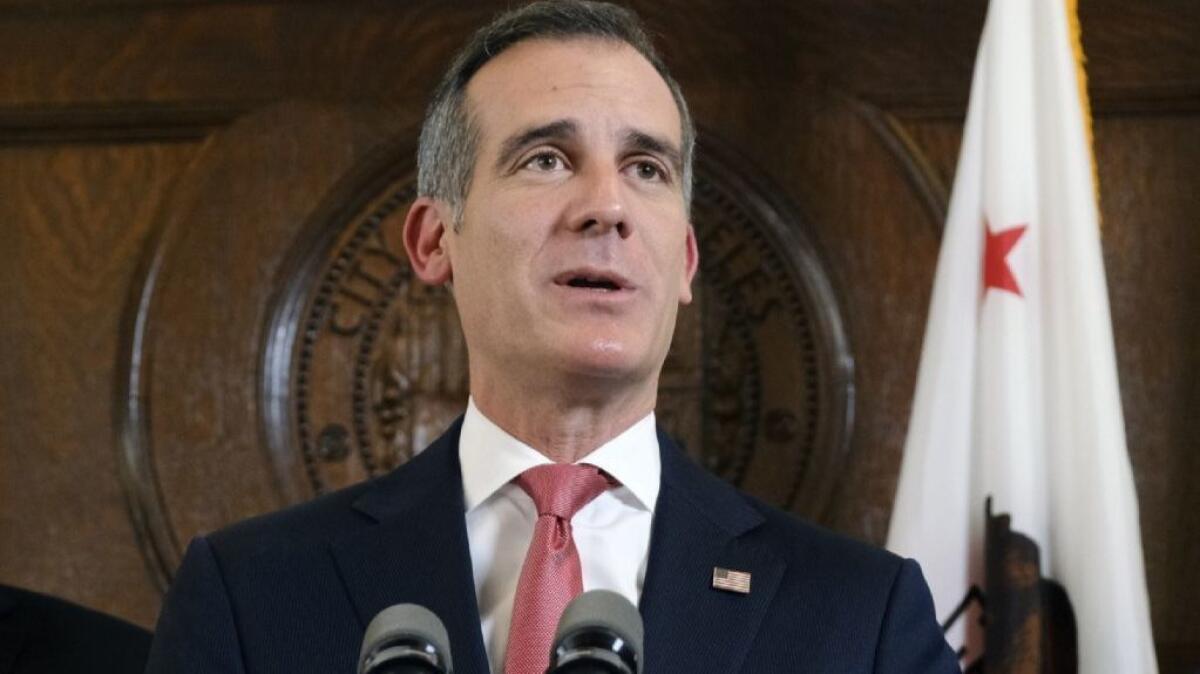Some donors sought out by Garcetti’s PAC don’t have to be disclosed

- Share via
The political action committee created by Los Angeles Mayor Eric Garcetti and his advisors collected more than $2 million for Democratic candidates and state parties ahead of the 2018 midterm elections — donations that were publicly disclosed as required by federal law.
The Garcetti-led Democratic Midterm Victory Fund also generated a smaller pot of money that it was not required to disclose — by asking friends of the mayor and his parents to give money directly to the state party groups.
Such donation requests, while not uncommon, raise concern among campaign finance watchdogs, who want those contributions tracked.
“Absolutely this is a problem,” said Rey Lopez-Calderon, executive director of California Common Cause. “Disclosure helps people know where money is coming from.”
Those contributions totaled just over $70,000, a tiny amount compared with the PAC’s haul. Still, the money highlights how PACs affiliated with politicians can direct donors to give to pet causes without having to reveal those requests.
The money was donated to the Oklahoma and California Democratic parties by Justin Liu, a top executive of Tireco, a Gardena-based tire company, and to the California group by philanthropists Dan Greenberg and Susan Steinhauser. They did so after a request from Rick Jacobs, the PAC’s fundraiser, said Victory Fund spokesman Yusef Robb.
Garcetti’s team provided the names of the donors in response to questions from The Times about the PAC’s stated goal of raising $100,000 each for Democratic organizations around the country.
“We work very hard to always comply with all disclosure rules and strive to err on the side of more transparency and extra caution, rather than less,” Robb said. He added that “we cannot report information to the FEC that they do not ask for.”
Liu, who went to high school with Garcetti and is a longtime friend of the mayor’s, gave $36,500 to the California Democratic Party and $10,000 to the Oklahoma state party, Robb said. Liu was among a group of business leaders who accompanied Garcetti on a trade trip to Asia in 2018, the mayor’s office confirmed.
The donations came through a partnership that Liu runs with his sister, Emily Foy, according to state filings. Liu did not respond to requests for comment.
Greenberg and Steinhauser, who are friends of Garcetti’s parents, were also asked to donate to the California Democratic Party, Robb said. Greenberg confirmed that he donated $25,000.
Robb said the requests were made to simplify the process of raising funds for state parties. He noted that campaign finance rules vary from state to state, and that in California the fund would have had to create a separate committee to raise significant funds for the state party.
In all, the PAC steered more than $60,000 to the California Democratic Party by asking donors to give directly. Now known as the Democratic Victory Fund, it will continue asking donors to give to the California organization to get to the $100,000 goal, Robb said.
The California Democratic Party reported receiving money from Liu and Greenberg. Still, party spokesman Roger Salazar said there’s no way for party leaders to know the donations were given at the request of the Victory Fund.
It’s not uncommon for politicians to seek out donors and direct them to give to a third party, said Paul Ryan, vice president of policy and litigation at the watchdog group Common Cause.
For example, a donor might have given the maximum amount to a politician’s committee, so the politician asks the donor to give elsewhere, Ryan said.
Federal law does not require a PAC to report solicitations unless the PAC directly handled the money. California’s disclosure law also doesn’t require such reporting.
However, California law does require state and local elected officials who seek some donations, including “behested” donations of $5,000 or more for charitable purposes, to report those solicitations.
Bob Stern, who helped draft L.A.’s ethics rules, said that state and local laws should also require the reporting of political fundraising of $5,000 or more for a third party.
“This seems to be a new trend,” Stern said. “If officials are saying give money to someone else, big money to someone else,” that money should be disclosed.
However, election law attorney Fred Woocher said it would be hard to track donations under such a law. He gave the example of an elected official giving a speech to a large group and asking everyone to donate to an organization. He questioned whether the official would have to then track down and report the names of those who ending up giving.
“It just reaches a point that it’s too much line-drawing and too burdensome,” Woocher said.
Twitter: @dakotacdsmith
More to Read
Sign up for Essential California
The most important California stories and recommendations in your inbox every morning.
You may occasionally receive promotional content from the Los Angeles Times.














